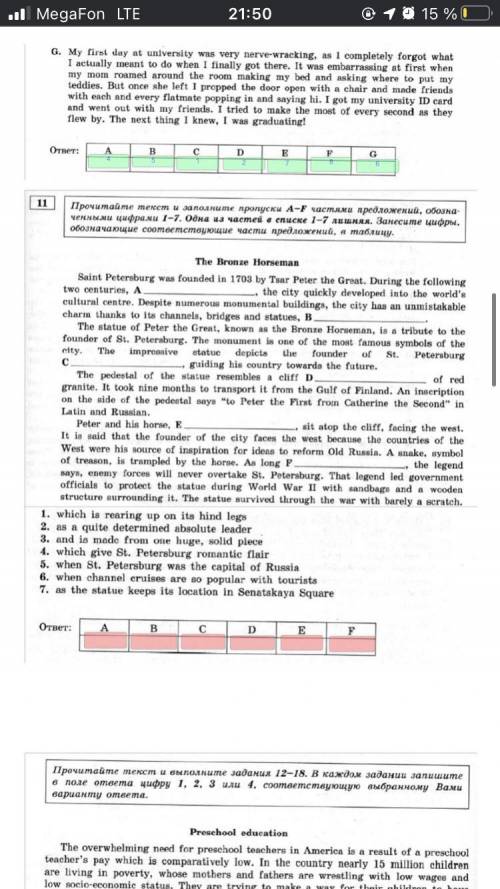Егэ по английскому с одиннадцатым

Другие вопросы по теме Английский язык
Популярные вопросы
- Найти угол ВОС, если угол ВОС+угол СОД+угол АОД=290 градуса....
3 - Назовите приборы для наблюдения за природой. Какие измерительные приборы...
3 - Напиши ответы на вопросы. Задание 1 стр. 66 Напиши об одной горе в Казахстане....
1 - Визначте синтаксичну роль в реченнях. Учіть дітей бачити, мислити, розвиватися....
2 - Що за елемент по електронній формулі яке має закінчення 3p3...
3 - Как?ну это не понятт есди ты...
3 - Даны точки B(1;2;0) и C(-11;1;-2). найдите точку E если известно, что BE:EC=2:5...
3 - • Какие из приведенных эпитетов В. А. Жуковский взял в народных сказ: а...
2 - Доберіть три прикметника якими можна охарактеризувати делоржа...
3 - сделайте в награду реально...
3
11 Прочитайте текст и заполните пропуски А-F частями предложений, обозна-
ченными цифрами 1-7. Одна из частей в списке 1-7 лишняя. Занесите цифры,
обозначающие соответствующие части предложений, в таблицу.
The Bronze Horseman
Saint Petersburg was founded in 1703 by Tsar Peter the Great. During the following
two centuries, A 5. when St. Petersburg was the capital of Russia the city quickly developed into the world's cultural centre. Despite numerous monumental buildings, the city has an unmistakable charm thanks to its channels, bridges and statues, B 4. which give St. Petersburg romantic flair.
The statue of Peter the Great, known as the Bronze Horseman, is a tribute to the
founder of St. Petersburg. The monument is one of the most famous symbols of the
city, The impressive statue depicts the founder of St. Petersburg C 2. as a quite determined absolute leader guiding his country towards the future.
The pedestal of the statue resembles a cliff D 3. and is made from one huge, solid plece of red granite. It took nine months to transport it from the Gulf of Finland. An inscription on the side of the pedestal says "to Peter the First from Catherine the Second" in Latin and Russian.
Peter and his horse, E 1. which is rearing up on its hind legs sit atop the cliff, facing the west. It is said that the founder of the city faces the west because the countries of the West were his source of inspiration for ideas to reform Old Russia. A snake, symbol of treason, is trampled by the horse. As long F 7. as the statue keeps its location in Senatskaya Square the legend says, enemy forces will never overtake St. Petersburg. That legend led government officials to protect the statue during World War II with sandbags and a wooden structure surrounding it. The statue survived through the war with barely a scratch.
6. when channel eruises are so popular with tourists